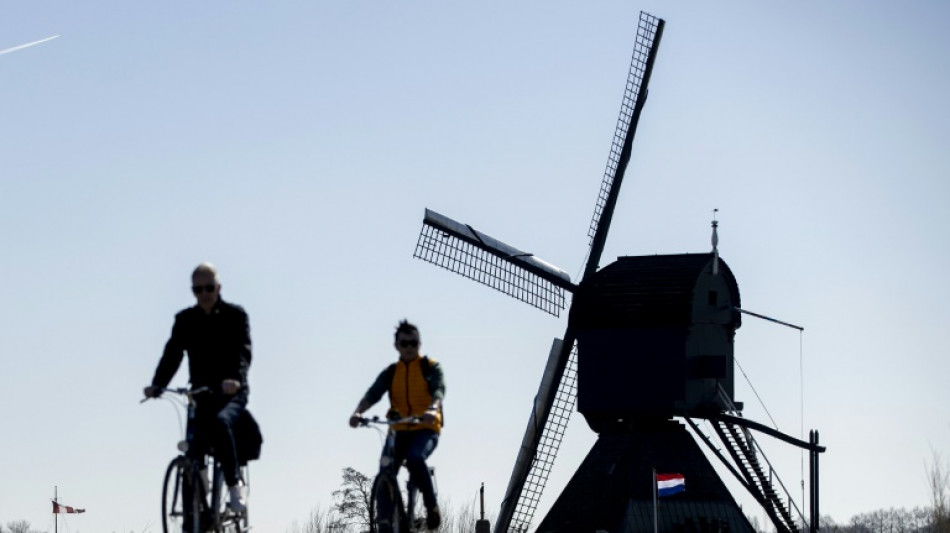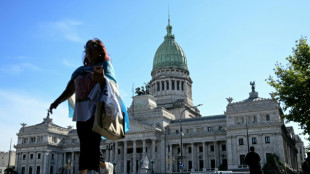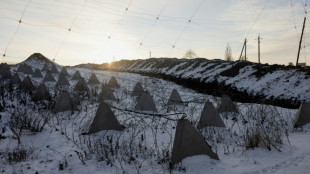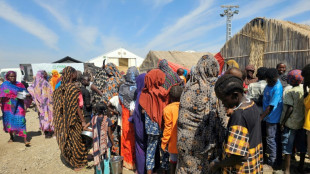
-
 McIlroy shares Riviera clubhouse lead as Rai charges, Scheffler fades
McIlroy shares Riviera clubhouse lead as Rai charges, Scheffler fades
-
Philippines' Duterte earned global infamy, praise at home

-
 Stocks drop, oil rises after Trump Iran threat
Stocks drop, oil rises after Trump Iran threat
-
As European heads roll from Epstein links, US fallout muted

-
 Families of Duterte's drug war victims eye Hague hearing hopefully
Families of Duterte's drug war victims eye Hague hearing hopefully
-
Russian decision is a betrayal: Ukrainian Paralympics chief

-
 Venezuela parliament unanimously approves amnesty law
Venezuela parliament unanimously approves amnesty law
-
Martinez missing as Inter limp to Lecce after Bodo/Glimt humbling

-
 India chases 'DeepSeek moment' with homegrown AI models
India chases 'DeepSeek moment' with homegrown AI models
-
World leaders to declare shared stance on AI at India summit

-
 'Everything was removed': Gambians share pain with FGM ban in balance
'Everything was removed': Gambians share pain with FGM ban in balance
-
Kim Jong Un opens rare party congress in North Korea

-
 Ex-Philippine leader Duterte faces pre-trial ICC hearing
Ex-Philippine leader Duterte faces pre-trial ICC hearing
-
Japanese star Sakamoto 'frustrated' at missing Olympic skating gold

-
 Japan inflation eases in welcome news for Takaichi
Japan inflation eases in welcome news for Takaichi
-
FIFA to lead $75m Palestinian soccer rebuilding fund

-
 Chicago Bears take key step in proposed Indiana stadium move
Chicago Bears take key step in proposed Indiana stadium move
-
Liu captures Olympic figure skating gold as US seal hockey glory

-
 North Korea opens key party congress
North Korea opens key party congress
-
Los Angeles sues Roblox over child exploitation claim

-
 Golden Liu puts US women back on top of Olympic women's figure skating
Golden Liu puts US women back on top of Olympic women's figure skating
-
Hodgkinson sets women's 800m world indoor record

-
 USA's Alysa Liu wins Olympic women's figure skating gold
USA's Alysa Liu wins Olympic women's figure skating gold
-
Man Utd cruise into Women's Champions League quarters

-
 Gu reaches Olympic halfpipe final after horror crash mars qualifiers
Gu reaches Olympic halfpipe final after horror crash mars qualifiers
-
Keller overtime strike gives USA Olympic women's ice hockey gold

-
 NASA delivers harsh assessment of botched Boeing Starliner test flight
NASA delivers harsh assessment of botched Boeing Starliner test flight
-
US Fed Governor Miran scales back call for rate cuts this year

-
 Gu qualifies for Olympic halfpipe final marred by horror crash
Gu qualifies for Olympic halfpipe final marred by horror crash
-
Trump issues Iran with ultimatum as US ramps up military presence

-
 Peru's brand-new president under fire for child sex comments
Peru's brand-new president under fire for child sex comments
-
UK police hold ex-prince Andrew for hours in unprecedented blow

-
 Former Olympic freeski halfpipe champion Sharpe crashes heavily
Former Olympic freeski halfpipe champion Sharpe crashes heavily
-
Former Olympic champion Sharpe suffers heavy halfpipe crash

-
 Belarus says US failed to issue visas for 'Board of Peace' meeting
Belarus says US failed to issue visas for 'Board of Peace' meeting
-
Forest boss Pereira makes perfect start with Fenerbahce rout in Europa play-offs

-
 Alcaraz fights back to book last four berth in Qatar
Alcaraz fights back to book last four berth in Qatar
-
England captain Itoje warns of 'corrosive' social media after abuse of Ireland's Edogbo

-
 War-weary Sudanese celebrate as Ramadan returns to Khartoum
War-weary Sudanese celebrate as Ramadan returns to Khartoum
-
Townsend expects recalled Scotland duo to shine in Six Nations clash with Wales

-
 Peru's new president under fire for child sex comments
Peru's new president under fire for child sex comments
-
UK king opens London fashion week despite brother's arrest

-
 Belarus frees opposition politician Statkevich
Belarus frees opposition politician Statkevich
-
Striking Argentine workers slow down Buenos Aires in protest over labor reforms

-
 Starlink loss a blow to Russian forces in Ukraine: experts
Starlink loss a blow to Russian forces in Ukraine: experts
-
UN's Sudan probe finds 'hallmarks of genocide' in El-Fasher

-
 Belarus frees opposition politician Statkevich: wife
Belarus frees opposition politician Statkevich: wife
-
Rocket re-entry pollution measured in atmosphere for first time

-
 Airbus ready to build two new European fighters if countries want
Airbus ready to build two new European fighters if countries want
-
Canada makes push to attract skilled migrants, including for defence


World could save 700 mn tonnes of CO2 if people cycled more, study shows
The world would save nearly 700 million tonnes of carbon pollution each year -- more than Canada's annual emissions -- if every person adopted the Dutch way of life and cycled on a daily basis, new research showed Thursday.
The transport sector currently accounts for a quarter of all fuel-related greenhouse gas emissions, which are warming the planet.
Half of those emissions are from passenger cars, and worldwide transport demand is predicted to triple by mid-century.
As they seek to decarbonise transport, governments and industry have turned towards electric vehicles, with 6.75 million units sold in 2021 alone.
Vehicle sales are tracked and published each year. However, it has been difficult to calculate the production and ownership of a much older, low-carbon technology: the bicycle.
An international team of researchers has now compiled the first global dataset of bicycle ownership and use by country dating back to the early 1960s, using statistical modelling to fill in any information gaps.
They found that between 1962-2015 global production of bikes outstripped that of cars, with China accounting for nearly two-thirds of the more than 123 million bikes manufactured in 2015.
Writing in the journal Communications Earth and Environment, the team showed that bicycle ownership was generally higher in upper-income and upper-middle-income countries -- but then so was the percentage of journeys undertaken by car.
This meant that high bicycle ownership does not necessarily lead to high bicycle use.
Among the 60 countries included in the dataset, the share of bicycle use for journeys was only five percent. Some countries, simply lack bicycle stocks, while others with high bike ownership, such as the United States, tended to view cycling as more of a leisure activity than a mode of transport.
- 'Going Dutch' -
The team calculated that if everyone emulated the Danish commute of cycling an average of 1.6 kilometres (1 mile) each day, the world could save some 414 million tonnes of CO2 a year -- equivalent to Britain's annual emissions.
"Going Dutch" and cycling 2.6 kilometres daily like people do in The Netherlands would save 686 million tonnes, and bring with it associated health benefits due to more exercise and improved air quality.
"A worldwide pro-bicycle policy and infrastructure development enabled modal shift like the Netherlands and Denmark can lead to significant untapped climate and health benefits," the authors wrote.
They said this dual benefit demanded better bicycle data collection, and said there was "an urgent need to promote sustainable bicycle use via supporting policy, planning, and infrastructure development."
The study's lead author, Gang Liu, a professor at the University of Southern Denmark's Department of Green Technology, said the research showed that bicycles had an important future role in lowering global transport's carbon footprint.
"Addressing such gigantic challenges requires not only technology-side strategies, such as lightweight design or electrification," he told AFP.
"But also needs demand-side strategies, such as alternative mobility patterns -- sharing mobility, on-demand mobility, and ride sharing -- and transport mode change, such as reducing short-distance car use by cycling."
D.Cunningha--AMWN



